10 Rome's Best Monuments
Rome is a treasure! If you are planning a trip to the Italian capital, take note of the main monuments you must see during your visit.

Visiting the Spanish Steps in Rome | ©Natasa Dav
Rome is a monumental city full of history where strolling through its streets feels like you are in an open-air museum. Everywhere you go you can find something amazing to see and marvel at.
If this is the first time you travel to the "Eternal City", in this post we make a review of the 10 best monuments in Rome so that you know the most essential ones that can not miss on your route in Rome.
Let's start!
1. The Roman Colosseum
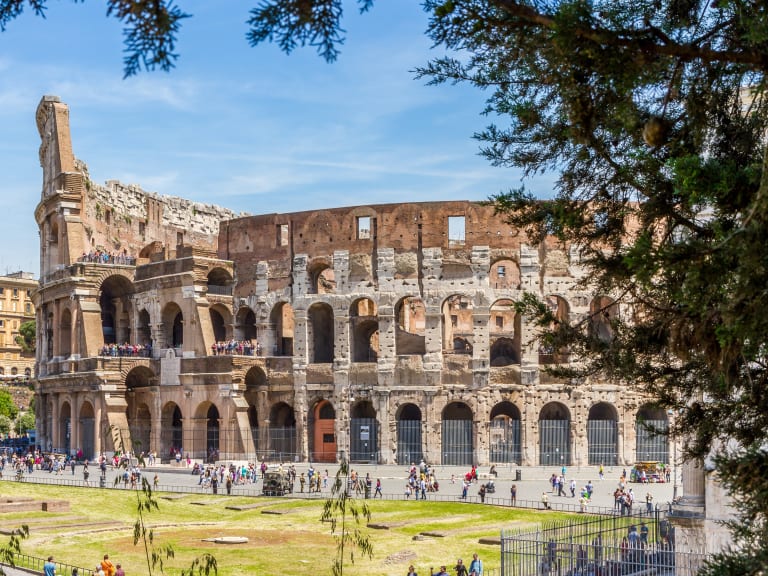
The Colosseum is the most important monument in Rome and a symbol of the city. With around two millennia of antiquity (that's a long time ago), it is the largest amphitheatre built during the Roman Empire, as it had a capacity for 50,000 spectators and no other building exceeded that figure until the 20th century.
Its construction began in 72 AD during the reign of Emperor Vespasian and for more than five centuries it hosted the most diverse spectacles: naval battles, gladiatorial combats, fights with wild animals and public executions of prisoners, among others.
If its architecture is impressive on the outside, inside the Colosseum will not leave you indifferent. There is no doubt that it is one of the best monuments in Rome and to visit it without having to queue forever at the entrance, I recommend some options:
- Visit to the Colosseum, the Forum and the Palatine Hill -from £35.
- Guided tour of the Colosseum with access to the arena and Roman Forum-from £63
- Guided tour of the Colosseum and the arena with tickets to the Roman Forum and Monte Palatino-from £60
- Guided tour of the Colosseum with access to the arena, Roman Forum and Monte Palatino-from £59
The last games held in the Colosseum took place in the 6th century AD and despite suffering several fires, earthquakes and despoilment during the Middle Ages, this iconic monument continues to dominate Rome's landscape.
- Address: Piazza del Colosseo, 00184 Rome.
- How to get to the Colosseum in Rome: By metro, line B, Colosseo station.
2. St. Peter's Basilica

St. Peter's Basilica is the largest Christian church in the world and an important spiritual symbol for Catholics, as it was erected over the tomb of St. Peter the Apostle (the first Pope in history) who was martyred in Rome and whose remains now rest inside.
In addition to being a religious icon, St. Peter's Basilica is also a masterpiece of the arts. Great artists such as Gian Lorenzo Bernini, Michelangelo, Giacomo Della Porta, Donato d'Angelo Bramante or Carlo Maderno took part in the project and the works lasted for almost 2 centuries.
There is a lot to see inside! To get to know it in depth and make the most of the experience, I recommend these options:
- Tickets for St. Peter's Basilica and the dome -from £46.
- Tickets to the dome of St. Peter's Basilica with audio guide-from £21
- Guided tour of St. Peter's Basilica and the Vatican Museums -from £41
- Guided tour of St. Peter's Basilica and the Tombs of the Popes -from £39
I recommend that you don't miss the Dome of St. Peter's Basilica, as from up there you will have one of the best views of Rome.
- Address: Piazza San Pietro, 00120. Vatican City.
- How to get there: By metro, line A, Ottaviano station.
3. Sistine Chapel
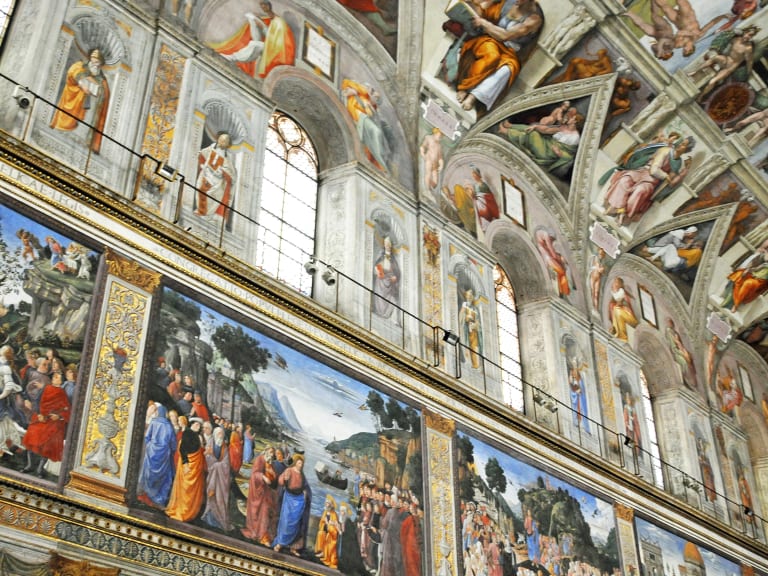
The Sistine Chap el is one of Rome's greatest Renaissance jewels and Michelangelo's masterpiece despite his inexperience in painting, as he claimed to be a sculptor and not a painter.
The commission from Julius II was a real challenge for the artist, who devoted ten years of his life to decorating the vault and the back wall above the high altar, and the result is a marvel. However, other artists who also worked in this space were Botticelli, Perugino or Luca.
It is undeniable that this is one of the essential places to see in Rome during a trip! You will find the Sistine Chapel near St. Peter's Basilica, within the tour of the Vatican Museums. You can opt for:
- Skip the line tickets to the Vatican Museums and Sistine Chapel -from £60
- Guided tour of the Vatican Museums, Sistine Chapel and St. Peter's Basilica -from £41
- Early morning guided tour of the Vatican and the Sistine Chapel -from £87
- Guided tour of the Vatican and the Sistine Chapel in small groups -from £119
This is one of the chapels of the Apostolic Palace in Vatican City, where the official residence of the Holy Father is located, and is known not only for its spectacular decoration but also for being the place where the Popes are chosen.
- Address: Viale Vaticano, 51.
- How to get there: By metro, line A, station Cipro-Musei Vaticani.
4. Trevi Fountain
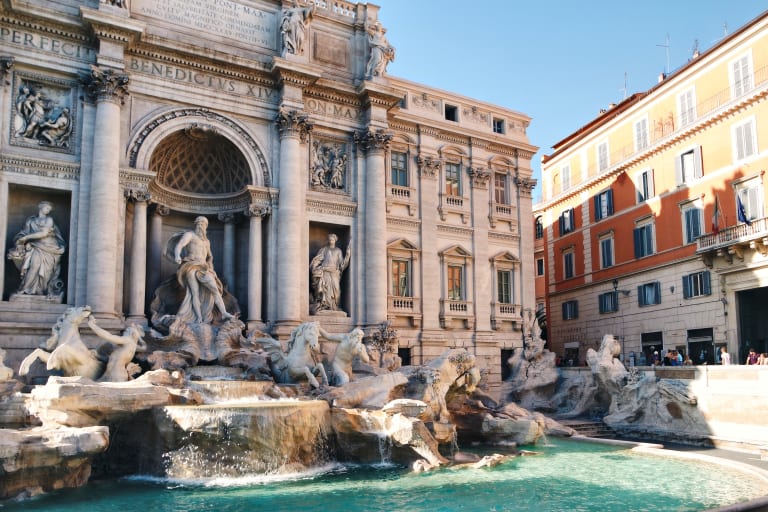
The Trevi Fountain is one of the best monuments in Rome and therefore one of the most visited places in the city. The reason is simple: it is the most beautiful fountain in the world.
Its history dates back to the time of Emperor Augustus, when this fountain was the final section of the Aqua Virgo aqueduct built in the 1st century BC. However, the current fountain dates from the 17th century and was commissioned by Pope Clement XII to the architect Nicola Salvi, who surprised everyone with this allegory of the ocean presided over by the god Neptune.
And it is something that happens for generations because when you see the Trevi Fountain from the front you will be impressed by the contrast between the small size of the square in which it stands and the monumentality of the fountain itself.
If you want to see it in all its splendour and avoid the crowds, I recommend you go at a time other than midday or at the end of the day as you are likely to come across a crowd of tourists, or book a tour of fountains and squares in Rome.
Don't forget to follow the tradition of tossing a coin in the water for fortune to bring you back to Rome.
- Address: Piazza di Trevi. 00187, Rome.
- How to get there: By metro, line A, Barberini station.
5. The Pantheon of Agrippa
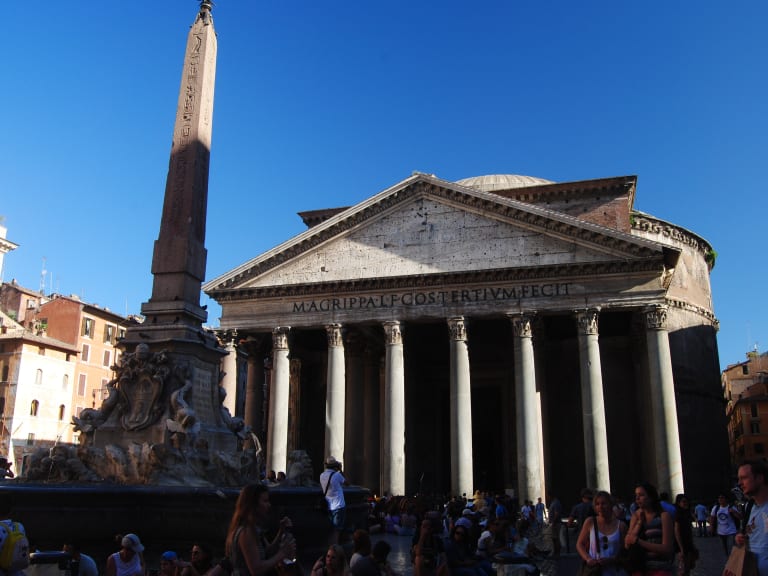
The Pantheon of Agrippa is one of the best monuments in Rome to visit, being the best preserved building of Ancient Rome. This was possible because at the beginning of the 7th century Pope Boniface IV transformed it into a church dedicated to Christians martyred in the persecutions.
This building dates back to the 2nd century AD and is one of the greatest works of Roman architecture. The most outstanding features of the Pantheon of Agrippa are the precision and harmony of its construction and the central oculus of the dome through which the sunlight penetrates, giving the temple a unique atmosphere.
This monument is well worth a visit at any time of the year but I recommend a guided visit especially on June 21st (during the summer solstice) to see the sunlight pass through the oculus perpendicularly or on Pentecost Sunday when after the 10:30 AM mass a shower of red petals is thrown through the oculus in memory of the descent of the Holy Spirit on the apostles. It is a beautiful spectacle!
Besides being a church, the Pantheon of Agrippa is also a royal pantheon as it contains the tombs of Vittorio Emanuele II, Umberto I and Margherita of Savoy and even the tomb of the Renaissance painter Raphael.
- Address: Piazza della Rotonda.
- How to get there: By metro, line A, Barberini station.
6. The Basilica of St. John Lateran
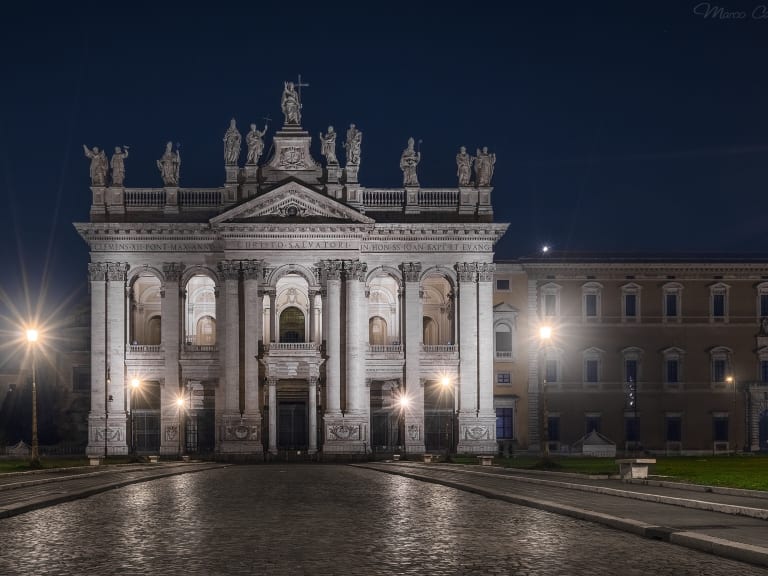
The Basilica of St. John Lateran is another of the best monuments to visit in Rome as it is a very special temple. Did you know that it was the first church to be built in the city back in the 4th century A.D.?
A must-see in the "Eternal City" is the catacombs and basilicas. Of the four major basilicas that exist, St. John Lateran is the most important of them all. Not only because of its historical significance as the cathedral of Rome and the place where, until not so long ago, all the Popes were proclaimed, but also because of the beauty of the interior of the basilica.
Its size will amaze you, as will the elegance of its chapels, the Cosmatesque cloister and the altar beneath a Gothic baldachin. In addition, you will see surprising sites such as the Sanctuary of the Holy Staircase, the Chapel Sancta Sanctorum* or the Lateran Palace which have a very interesting history within Christianity.
- Address: Piazza di San Giovanni in Laterano, 4.
- How to get there: By metro, line A, station San Giovanni.
7. The Roman Forum
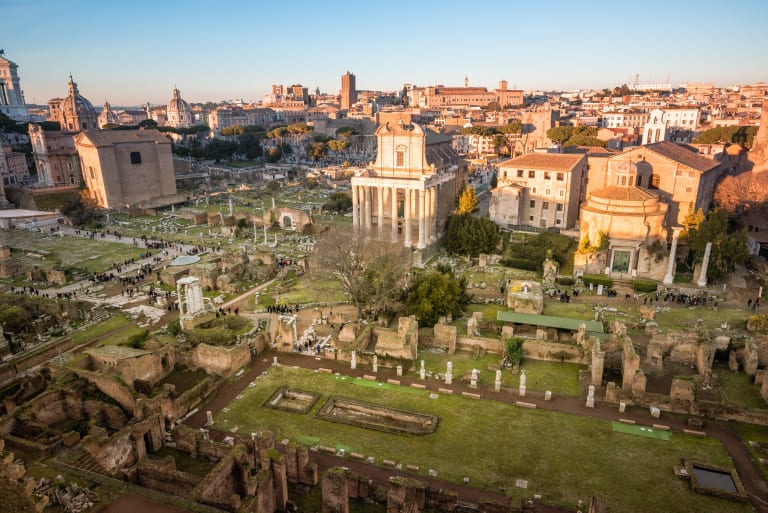
Next to the Colosseum you will find the Roman Forum, another example of Rome's finest monuments that will complete your vision of Ancient Rome along with other tourist attractions of the time such as the Pantheon of Agrippa, the Baths of Caracalla or the Flavian Amphitheatre itself.
The Roman Forum represented the epicentre of public life during the Republic and the Empire. It is one of the most interesting places in the city as it is full of temples, palaces, arches and other constructions that are generally in a good state of preservation. In fact, walking along the Via Sacra, you can imagine what Rome was like during its heyday more than 2,000 years ago. There is so much to explore here that I suggest these options:
- Visit the Colosseum, Forum and Palatine Hill
- Guided tour with priority access to the Colosseum, the Roman Forum and the Palatine Hill
- Tickets for the Roman Forum and the Palatine Hill with multimedia experience
This is one of the essential visits to do in Rome and as it is such a popular place, I advise you to get your tickets in advance to avoid the long queues of tourists that form at the entrances. In the post about tickets to the Roman Forum you can see how to get them so you don't miss anything.
- Address: Via della Salara Vecchia, 5/6, 00186 Rome.
- How to get there: By metro, line B, Colosseo station.
8. Sant'Angelo Castle
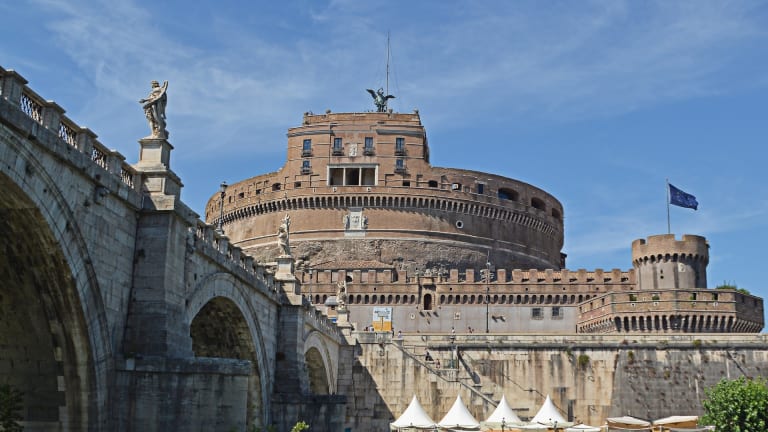
On the right bank of the Tiber River, a short distance from the Vatican, you will find Castel Sant'Angelo. A 2nd century AD fortress that Emperor Hadrian designed as his family mausoleum but which ended up becoming a military building and a papal residence used in times of turmoil. Today, this monument houses the Museo Nazionale di Castel Sant'Angelo with a very interesting collection of paintings, sculptures, ceramics and period weapons.
To organise your visit you can opt for:
- Skip the line tickets for Castel Sant'Angelo -from £26
- Tickets with audio guide for the Castel Sant'Angelo -from £19.
- Guided tour of Castel Sant'Angelo -from £55.
- Express guided tour of Castel Sant'Angelo-from £50
I recommend buying tickets to the Castel Sant'Angelo not only because of its historical importance and the value of the pieces in the museum but also because from the terrace of the fortress you will have one of the most beautiful views of the city with the Tiber river, St. Peter's Basilica and the Sant'Angelo Bridge (one of the most beautiful bridges in Rome) on the horizon.
- Address: Lungotevere Castello, 50.
- How to get there: By bus, lines 23, 34, 49, 49, 64, 87, 280, 492, 926 and 990.
9. The Catacombs of Rome
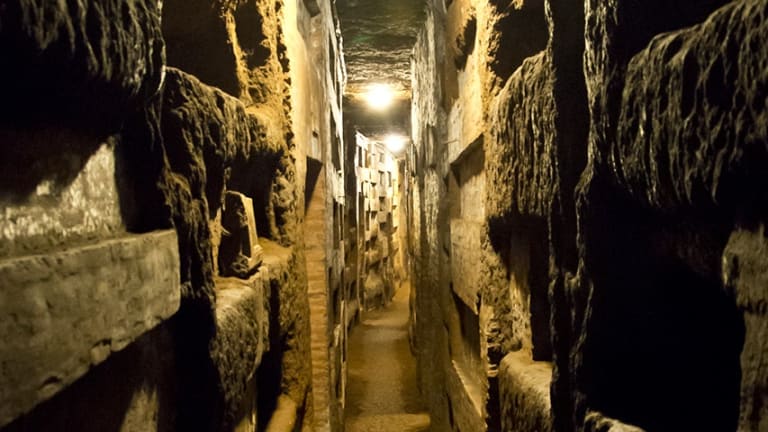
There are more than sixty catacombs in Rome, made up of hundreds of kilometres of underground galleries containing thousands of tombs. In the popular imagination, the catacombs were the hiding place where the first Christians took refuge fleeing imperial persecution, but in reality they were cemeteries where Christians buried their dead and only in very exceptional cases did they serve as an occasional refuge for the celebration of the Eucharist.
Of all the catacombs in Rome, only a few can be visited, in particular those with the greatest historical interest, such as those of St. Callixtus, St. Sebastian or Domitilla (on the Appian Way) or those of St. Agnes or St. Priscilla (in the north of the city).
You can only visit Rome's catacombs on an organised guided tour, as you will be travelling into the depths of the earth and the tunnels are somewhat narrow and dark. If you are not claustrophobic, this is one of the best monuments in Rome to visit.
If exploring the catacombs of the "Eternal City" is one of the activities you definitely want to do during your trip, then I recommend you to read the post about tickets for the Catacombs of Rome to find out how to get them, and don't forget the Vatican Catacombs1
- Address: Various locations
- How to get there: To get to the Catacombs of St. Callixtus on Via Appia you can take the 118 bus from the Colosseo metro station (line B).
10. The Monument to Vittorio Emanuele II
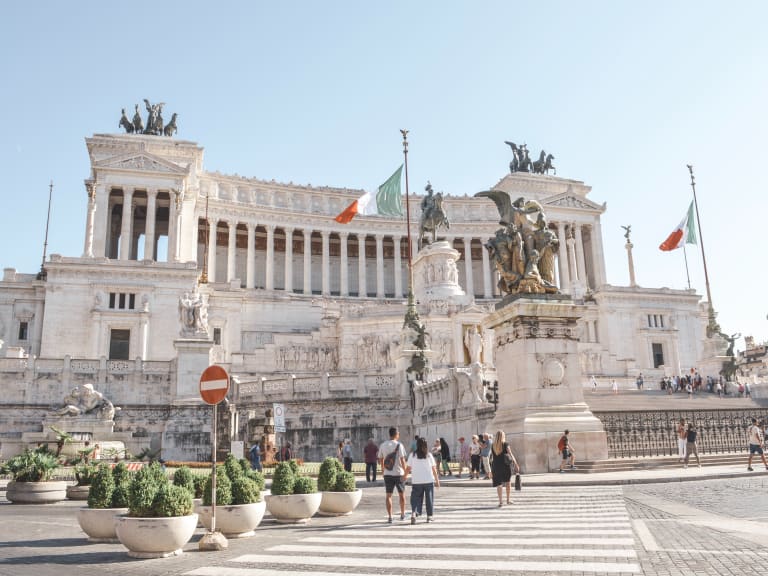
Popularly known as "Vittoriale", the Monument to King Vittorio Emanuele II is a colossal white marble construction erected to honour the nation and the monarch after the reunification of Italy.
Curiously, the monument was initially disliked by the Romans because they felt that its size and style did not fit in with the surroundings of Piazza Venezia. Today, however, it is one of Rome's most popular monuments with visitors.
It houses the Central Museum of the Risorgimento, the Institute for the History of the Italian Risorgimento and the Tomb of the Unknown Soldier where the eternal flame shines in homage to those who have fallen for the Fatherland.
However, one of the main attractions of this monument for tourists, apart from its majestic aesthetics, are the panoramic views from the upper terrace (at the height of the quadrigas) of the Colosseum, the Imperial Forums, the Roman Forum, the Via del Corso or the Trajan Column. You won't be able to stop taking pictures!
- Address: Piazza Venezia
- How to get there: By bus, lines 30, 51, 83, 87, 160 and 170.
